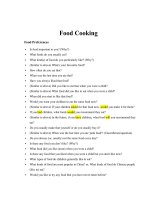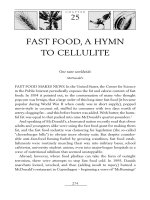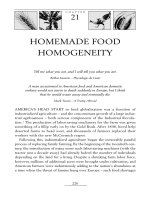56502 food task
Bạn đang xem bản rút gọn của tài liệu. Xem và tải ngay bản đầy đủ của tài liệu tại đây (227.48 KB, 4 trang )
NAMES: __________________________________________________________
LEVEL: _________ DATE:___________
Foods made from grains (wheat, rice, and oats) help form the foundation of a nutritious
diet. They provide vitamins, minerals, carbohydrates (starch and dietary fiber), and other
substances that are important for good health. Grain products are low in fat, unless fat is
added in processing, in preparation, or at the table. Whole grains differ from refined grains
in the amount of fiber and nutrients they provide, and different whole grain foods differ in
nutrient content, so choose a variety of whole and enriched grains. Eating plenty of whole
grains, such as whole wheat bread or oatmeal, as part of the healthful eating patterns
described by these guidelines, may help protect you against many chronic diseases. Aim
for at least 6 servings of grain products per day—more if you are an older child or
teenager, an adult man, or an active woman—and include several servings of whole grain
foods.
Vitamins, minerals, fiber, and other protective substances in whole grain foods contribute
to the health benefits of whole grains. Refined grains are low in fiber and in the protective
substances that accompany fiber. Eating plenty of fiber-containing foods, such as whole
grains (and also many fruits and vegetables) promotes proper bowel function. The high
fiber content of many whole grains may also help you to feel full with fewer calories. Fiber
is best obtained from foods like whole grains, fruits, and vegetables rather than from fiber
supplements for several reasons: there are many types of fiber, the composition of fiber is
poorly understood, and other protective substances accompany fiber in foods.
• Answer the following
questions.
1. What types of carbohydrates
does grain provide the body
with?
_________________________________
_________________________________
2. What's the difference
between whole grain and
refined grain products?
________________________________
_
________________________________
_
3. Why does a teenager require
more grain than an adult?
________________________________
_
________________________________
_
________________________________
_
4. Why are you often told to eat
products that are high in fiber?
________________________________
_
________________________________
_
________________________________
_
• Vocabulary building. Find the meaning of 20 words.
ENGLISH
TRANSLATION
ENGLISH
TRANSLATION
• Complete the mapping about the Reading
FOOD
• Write your opinion about the reading.









